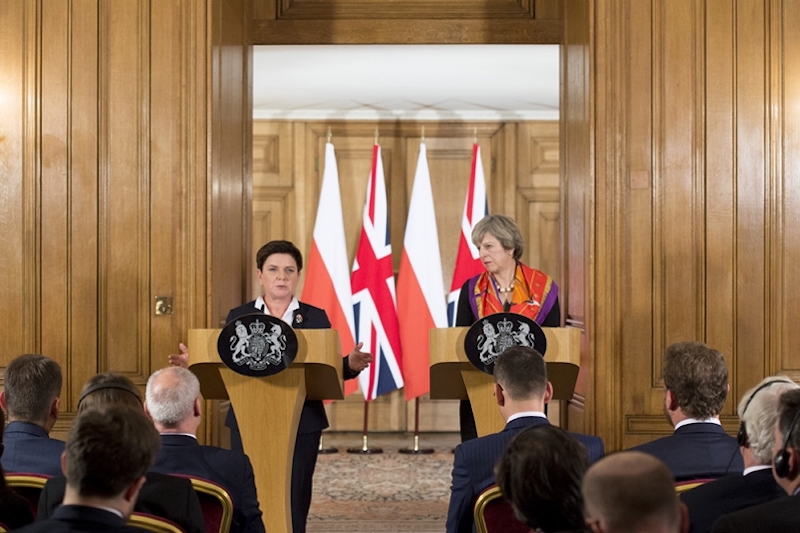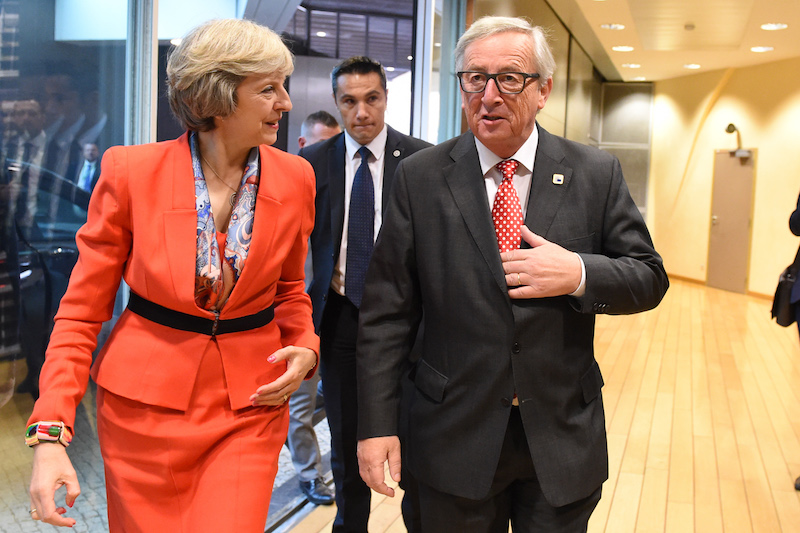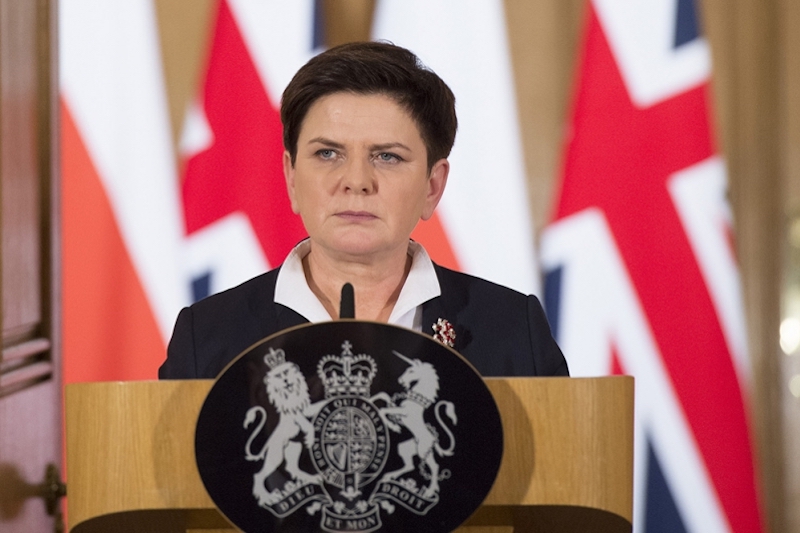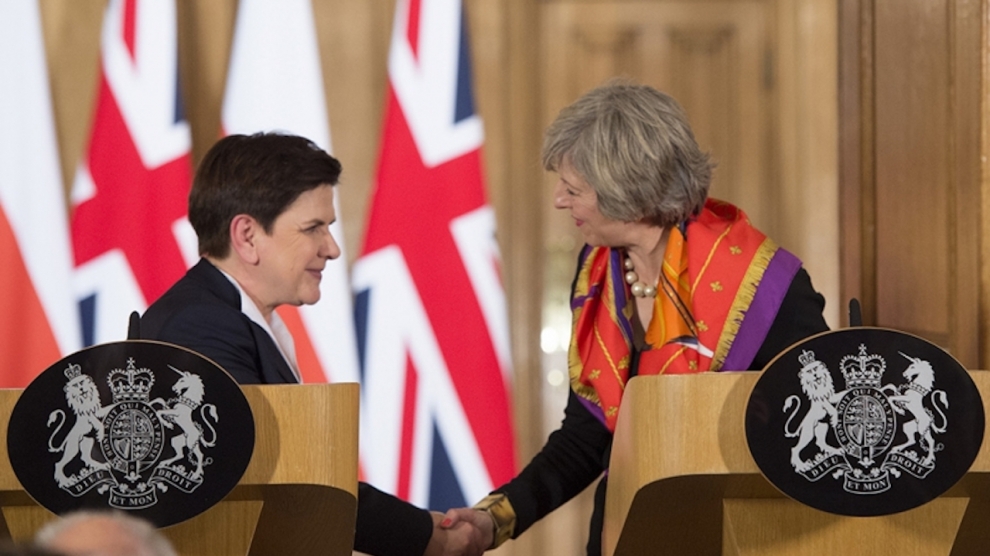Brexit means that Poland’s right-wing government is losing its most important EU ally and the opposition warns that the country could end up marginalised on the European periphery. However, the ruling party argues that Warsaw is a leader in debates on the EU’s future and is calling for a re-think of the trajectory of the European project. However, the future status of Poles, living in the UK, could complicate its plans to ensure an amicable Brexit settlement.
Similar goals
Brexit means that Poland is losing a key EU ally. Both countries shared a similar vision of an expanded single market combined with a reluctance to allow the EU more economic policy powers, especially on taxation. They are strongly Atlanticist and viewed the development of EU security and defence policies as complementary to the NATO alliance, rather than an alternative. Poland also saw the UK as a strong supporter of an assertive EU approach towards Russia, fearing that France and Germany were too much in favour of striking up cosy bi-lateral deals with Moscow that side-lined the post-communist states.
Indeed, the current Polish government, which has been led by the right-wing Law and Justice (PiS) party since autumn 2015, viewed Britain as its most important strategic partner within the EU. Law and Justice came to office arguing that Poland needed to move away from the EU strategy that had been pursued by its predecessor, led by the centrist Civic Platform (PO) party. This involved trying to locate Poland within the so-called ‘mainstream’ by presenting the country as a ‘model’ European state at the forefront of integration as well as prioritising the development of close relations with the main EU powers, particularly Germany.
Law and Justice, on the other hand, argued that Poland needed to be more robust and assertive in advancing its national interests and in forming its ‘own stream’ within the EU, for example, by building alliances with central and East European post-communist states in order to counter-balance the influence of the Franco-German axis. It identified Britain’s conservative government, which had a similar anti-federalist approach towards EU integration, as its most significant ally in advancing this project.

The British conservatives also defended Law and Justice in its bitter dispute with the European Commission over the membership and function of Poland’s constitutional tribunal. The Commission claims that there is a ‘systemic threat’ to democracy and the rule of law in Poland and is considering making a recommendation to the European Council that sanctions be imposed under Article 7 of the European treaties; in the worst-case scenario suspending Warsaw’s voting rights.
However, Law and Justice both questions the legality of the Commission’s actions and rejects its claims as biased, arguing that the government has simply been trying to restore pluralism and balance to a public institution that was illegally packed with supporters of the previous governing party. It is expected that Britain will join Hungary, and possibly other states, in opposing any attempts to introduce sanctions on Poland, which require unanimity in the Council.
Repairing not dismantling
However, despite its anti-federalism and its commitment to defending Polish sovereignty, the dominant view within Law and Justice is that it is in Poland’s interests to remain in the EU and to try to reform it from within. As Polish foreign minister Witold Waszczykowski put it, in last month’s parliamentary foreign policy debate, the government’s ‘… priority is to repair the European Union, not to dismantle it’. Only fringe political groupings on the radical Eurosceptic right have called for a ‘Polexit’. Although most Poles are critical of attempts to deepen European integration, in a number of areas, the overwhelmingly majority of them support continued EU membership.
More exactly, Law and Justice sees the debate about the future of the EU as precipitated by Brexit; that it is an opportunity for a fundamental re-think of the trajectory of the European project. The party argues that the Brexit vote was a vindication of its critique of the EU political elite who precipitated mounting Euroscepticm by over-centralising and trying to force their vision of a deeper European integration, against the popular will.
Law and Justice is calling for a new European treaty that brings the EU back to its original role as a looser alliance of economically co-operating sovereign nation-states, with a more clearly defined division of rights between the Union and its members and a consensual decision making process that makes it more difficult for any country to gain hegemony. This would involve: weakening the Commission’s bureaucracy, whose role would be restricted to regulating the single market; restoring more decision-making power to national governments and parliaments and reducing the dominant role of the Franco-German axis.
Marginalised on the EU’s periphery?
However, Poland’s main opposition parties, Civic Platform and the smaller liberal ‘Modern’ (Nowoczesna) grouping, have argued that not only is there little appetite for amending the EU treaties but – with the departure of the UK, the largest non-Eurozone economy – the locus of Union decision making is likely to shift to those states that are part of the single currency area. They say that alliances with post-communist states are not an effective counterweight to the Franco-German axis because these encompass too many conflicting interests. They have also criticised Law and Justice for suggesting that Poland will not support the extension of former Civic Platform prime minister Donald Tusk’s mandate when his first term as EU Council President expires in May: this despite the fact that he enjoys widespread backing from European leaders.

Law and Justice argue that instead of protecting Polish national interests Mr Tusk has used his position as a platform, to criticise the government. The ruling party warns that he could face several investigations relating to his actions as prime minister and, according to some sources, appears to be promoting semi-detached Civic Platform MEP Jacek Saryusz-Wolski as an alternative Polish candidate for the post.
Given Poland’s isolation from the major EU powers under Law and Justice, the opposition argue that there is a real danger that the country will end up alone on the EU’s side-lines. They have, therefore, called upon the government to locate Poland, once again, within European mainstream politics by both complying with the Commission’s ‘rule of law’ recommendations and by re-building the country’s previously close links with the Franco-German axis, especially its strategic partnership with Berlin.
They also propose re-opening the debate on the Polish adoption of the Euro, so that Warsaw is at the heart of a Union that, they argue, will inevitably integrate more closely around its Eurozone hard core. Although it has not ruled out Eurozone accession (which most Poles oppose) in principle, Law and Justice argues that, given the single currency’s huge problems, it cannot envisage any point in the foreseeable future where it would be advantageous for Poland to adopt the Euro.
A pivot towards Germany?
In fact, with the imminent loss of its main EU ally and attempts to build a closer co-operation with other post-communist states proceeding fairly slowly, some commentators have noted a pivot in Poland’s international relations towards a closer co-operation with Berlin. This was exemplified by German Chancellor Angela Merkel’s visit to Poland, in February, and by meetings with government and Law and Justice leaders.
The visit was billed by some as the most important by a German leader since the collapse of communism in 1989, and hailed by government supporters as both an indication that there are no serious problems with Polish-German relations and an important symbol of Poland’s role as a key leader in debates on the EU’s future.
Clearly, relations between the two countries remain strained over a number of issues. For example, Poland has criticised Berlin for failing to oppose the ‘Nord Stream 2’ pipeline that is being built under the Baltic Sea by Russian energy giant Gazprom, to send gas directly to Germany. Warsaw argues that this undermines common European energy policies and is contrary to Mrs Merkel’s attempts to encourage a tough EU stance towards Moscow.
Long-standing disagreements have been supplemented by new ones, over issues such as the European migration crisis, with Law and Justice opposing attempts, championed by Germany, to relocate migrants from North Africa and the Middle East across all EU states including Poland.
However, although the government’s critics argue that one high profile visit does not represent a political breakthrough, the leaders of the two countries do appear to have put contentious issues that could undermine strategic co-operation on the back burner. Law and Justice believes that, for all their policy differences, a Merkel administration is its preferred partner in Germany.
At the same time, the Merkel government appears to have accepted that it will have to deal with Law and Justice, at least until the next Polish parliamentary election in the autumn of 2019. Although Berlin seems to share the Commission’s concerns about Law and Justice’s approach to Poland’s constitutional tribunal crisis, it is also wary of alienating the Polish government at a time when the EU faces an existential crisis.
Migrant rights could limit Warsaw’s room for manoeuvre
In terms of the Brexit negotiations, the Polish government wants the EU to maintain close relations with the UK and is trying to position itself as the leader of those states opposing punitive action against London. The UK is not only an important trading partner for Poland, but more importantly Warsaw wants Britain to remain engaged in the European continent as a military security actor.

However, there are a number of issues that could complicate Warsaw’s plans to ensure an amicable separation. One of these is the question of the UK’s contribution to the 2014-20 EU budget. Poland is currently the biggest beneficiary of EU regional funds, which many commentators see as crucial to the country’s economic modernisation. At the same time, given that the UK is one of the largest net contributors, Brexit will almost certainly limit the scale of these fiscal transfers. So the Polish government will need to try and protect this funding, particularly given that this is likely to be last time that Warsaw benefits so substantially from EU aid.
However, perhaps the most important complicating issue is the future status of the UK’s Polish community. The ability to be able to travel and work abroad has been one of the main pillars of support for EU membership in Poland, although it has led to skill shortages in some sectors of the Polish economy.
Britain was one of the few states that gave immediate and relatively unrestricted access to its national labour market to workers from the post-communist states which, like Poland, joined the EU in 2004. As a consequence, the UK has been one of the most popular destinations for Poles seeking work in Western Europe, with an estimated 800-900,000 Polish migrant workers currently living there. However, the ability to regain control over immigration from EU countries was one of the key reasons why British people voted for Brexit in last June’s referendum.
In fact, the Polish government is keen to lure migrant workers back to their homeland so it is likely to accept that there will be restrictions on Poles hoping to access the UK labour market in the future. Rather, it will concentrate on protecting the current status and rights of Polish citizens living in the UK. For its part, the British government has promised to guarantee the status of these Polish (and other EU) citizens as quickly as possible, providing that the rights of British citizens living in other EU countries are also maintained.
However, it is not clear what the ‘cut-off’ date will be for who is to be included in this guarantee, and if it will encompass access to all state benefits. The fate of the Polish community in the UK is of huge domestic political significance as virtually every family in Poland has someone living and working there. So, whatever its aspirations to lead broader debates on the EU’s future, Warsaw has little room for manoeuvre on this issue, making it much trickier for it to play the role of main spokesman for an amicable Brexit settlement.
The editorial was originally published in the Polish Politics Blog. (Main photo — source: kprm.gov.pl)
_______________
The views expressed in this opinion editorial are the author’s own and do not necessarily reflect Emerging Europe’s editorial policy.

